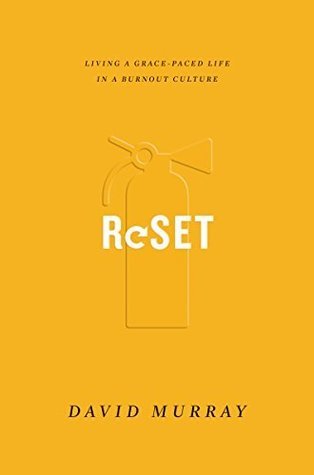I will begin by telling you what I wish I had known before I requested it to review: this is a book for men. Throughout the book, he stresses that it is for men again and again. He hints that a book for women, I believe written by his wife, will be written and eventually published. But this book is FOR MEN. It has manly-man metaphors throughout.
The premise of this one is that Christian men burnout easily and most--if not all--need to be RESET. He argues that there is often a huge disconnect between a man's theology and doctrine and his daily practice. Christian men may believe in the five solas of the reformation, but they live by the five deficits.
Murray promises in the first few pages not to waste anyone's time. He promises that the book from cover to cover will be practical and relevant. The first few chapters are more of an inventory and invitation to reflect and analyze…to self-diagnos. The remaining chapters take you into the garage to fix what's wrong in your life.
One of my favorite chapters--perhaps my only favorite chapter--is on sleep.
- Few things are as theological as sleep. Show me your sleep pattern and I’ll show you your theology, because we all preach a sermon in and by our sleep.
- Question: Which of the Ten Commandments can you keep in your sleep? Answer: The sixth commandment, because, as the following statistics demonstrate, getting enough sleep is an act of loving your neighbor.
- If our schools substituted sleepology for algebra, our society would be much healthier, safer, and brighter. Despite sleep taking up a quarter to a third of our lives and having such an influence on the remainder, most of us leave school in total ignorance of the why and the how of sleep.
- We need to ask God to help us see this as a life priority, as a matter of obedience, and as a way of pleasing our Father and Creator. Let’s plead with him to give us the strength to do what we know we must do.
- By sleeping, we are relinquishing control and reminding ourselves—at least for a few hours—that God actually doesn’t need us. When we close our eyes each night, we are saying, “I don’t run the world, or the church, or even my own little life.”
- When and how long we sleep makes a huge statement about who we are and what we believe about ourselves and God.
- Ultimately, sleep, like everything else, should lead us to the gospel and the Savior. First, it prompts us to think about death, that we shall all close our eyes as in sleep, and wake up in another world (1 Thess. 4:14). It also teaches about our Savior. The fact that Jesus slept (Mark 4:38) is as profound as “Jesus wept” (John 11:35). It reminds us of Christ’s full humanity, that the Son of God became so frail, so weak, so human that he needed to sleep. What humility! What love! What an example! What a comfort! What a sleeping pill! It illustrates salvation. How much are we doing when we sleep? Nothing! That’s why Jesus used rest as an illustration of his salvation. “Come to me, all you who labor and are heavy laden, and I will give you rest” (Matt. 11:28). It points us toward heaven. There remains a rest for the people of God (Heb. 4:9). That doesn’t mean heaven is going to be one long lie-in. It means it will be a place of renewal, refreshment, comfort, and perfect peace.
Another chapter that gave some good insights was on the importance of relaxation and having hobbies. This chapter talked about the joys and benefits of reading:
There is something about reading, however, especially reading real paper books, that can be especially health-giving. In “How Changing Your Reading Habits Can Transform Your Health,” Michael Grothaus says, “Reading doesn’t just improve your knowledge, it can help fight depression, make you more confident, empathetic, and a better decision-maker.”
Reading for pleasure can help prevent conditions such as stress, depression, and dementia. People who read books regularly are on average more satisfied with life, happier, and more likely to feel that the things they do in life are worthwhile. In a survey of fifteen hundred adult readers, 76 percent said that reading improves their lives and helps to make them feel good.His book covers most of the basics of life: eating and drinking, exercise, sleeping, working, playing, etc. He recommends an amended to do list:
1. Definite do. These are our most important God-given responsibilities and commitments. 2. Desire to do. These are activities we hope to do, and will do some of them after the “Definite-do’s” are done. 3. Delay do. These are worthy activities that we would love to do someday, but which we have to postpone until we have space and time in our schedules. 4. Don’t do. These are the things we either commit to stop doing or to say “no” to in the future.
© Becky Laney of Operation Actually Read Bible


No comments:
Post a Comment